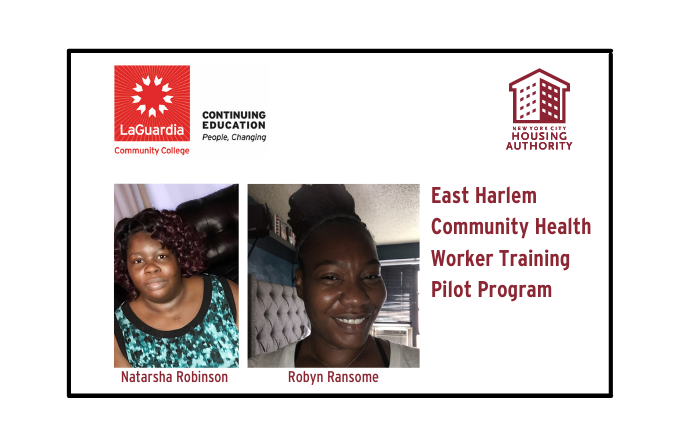Training Residents to Take Care of Their Community’s Health
Community Health Workers (CHW) are important public health advocates who help people manage chronic health conditions; educate and guide them through the medical system; and connect them to much-needed health and social services in a culturally appropriate manner. Many CHWs are members of the communities they serve, trusted neighbors who liaise between hospitals and other health organizations and their clients. Research has proven that CHWs help improve health outcomes and lower health care costs in the communities they work in.
Thanks to the East Harlem Community Health Worker Training pilot program between NYCHA and LaGuardia Community College, 13 NYCHA residents have trained to join this essential, growing field and support their fellow NYCHA residents and community members in managing their health.
Participants in the pilot took intensive online classes at LaGuardia Community College on topics such as communication skills, health and wellness, and how to navigate health care systems. They also completed 130 hours of on-the-job experience as interns with partner organizations.
Robyn Ransome, a Washington Houses resident and pilot participant, said each class built upon the previous class and “at the end of all the classes, I have a whole understanding of how to best assist the people in my community.”
Ms. Ransome previously worked in mental health services for over 10 years. She was about to start a new position before COVID-19 hit, but the role was terminated due to the pandemic. This pilot program presented itself at the perfect time and is moving her a step closer to her career goals. She has a bachelor’s degree in psychology, and plans to attend graduate school for social work and public health. In the future, she’d like to be a clinical holistic therapist and help patients deal with mental health issues.
Another participant, Natarsha Robinson, said she learned “about how racial and economic disparities can affect health, how to collect data, how to ask open-ended questions with empathy, and how to put myself in someone else’s shoes and be compassionate with clients. I also learned that East Harlem has a high rate of asthmatic and COPD patients.”
Ms. Robinson, a Wilson Houses resident who was previously a school crossing guard, believes the pilot taught her more about her own health while also teaching her how to contribute more to her community: “I’ve always wanted to work in the health industry but I’m not good with blood and emergency situations. I also wanted to do something to help my community, and this program was a combination of both so it really intrigued me.”
Ms. Robinson got experience with the type of work she hopes to do in the future through her internship with Asian Community Care Management. She helped one of the company’s CHWs with check-in calls to clients to see whether they needed assistance with their health care needs, including medication management and social services referrals.
Now that these 13 residents have graduated from the pilot program, they are receiving one-on-one job placement support. Ten residents have already been connected to their first paid position, a six-month position as CHWs for an NYU research study to improve COVID-19 testing for NYCHA residents.
During her internship at NYU Langone, Ms. Ransome helped prepare materials for the research study, which is set to begin in early 2021. She received training on contact tracing and worked on preparing brochures and FAQs. Once the study begins, she and the nine other CHWs will work at partner community organizations near six NYCHA developments to educate residents about COVID-19 testing; explain testing options; answer questions; and work with NYU researchers, partner organizations, and residents to help build a network that reduces COVID-19-related disparities in these high-risk populations.
Ms. Ransome is looking forward to working on this important project and is thankful for the opportunity: “What I want other residents to know is that I found out about this program through the REES newsletter. There are so many opportunities; people should sign up to receive the newsletter. Thanks to it, I received free training and I’m going to have a six-month employment opportunity, plus the chance to work more.”

